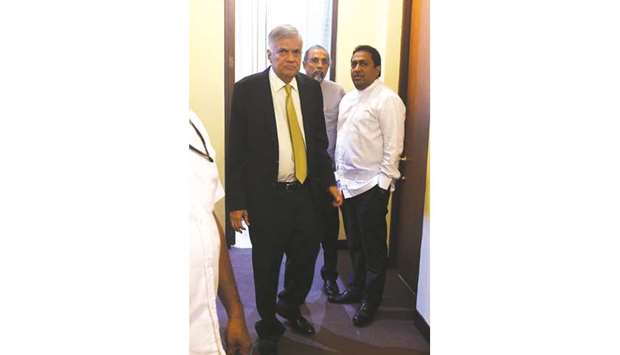Sri Lankan Prime Minister Ranil Wickremesinghe yesterday survived a no-confidence vote in parliament after a majority of the legislators in the House voted to support his coalition
government.
The opposition, eyeing fractures within the ruling alliance, had sponsored the trust vote against Wickremesinghe blaming him for failing to prevent an alleged scam in the bond market, and for failing to stop anti-Muslim riots that occurred last month.
The vote showed Wickremesinghe winning the support of 122 members of the 225-member parliament.
Wickremesinghe has resisted calls to resign from President Maithripala Sirisena, whose Sri Lanka Freedom Party had threatened to vote against the prime minister over an alleged scandal in the bond market.
The motion was put to a vote yesterday evening after a marathon debate.
Sirisena joined hands with Wickremesinghe’s United National Party to oust strongman president Mahinda Rajapakse in January 2015 after a decade in power.
But the pair have since been embroiled in a power struggle, especially over economic policy, which has sowed divisions in leadership.
Sirisena publicly blamed the free-market champion for mismanaging the economy as Sri Lanka’s growth plunged to a 16-year low of 3.1% in 2017.
A multi-billion bond scandal at Sri Lanka’s central bank - which fell under Wickremesinghe’s portfolio until Sirisena removed it last month - only deepened acrimony between the leaders.
The prime minister was cleared of any wrongdoing but accused of trying to protect a former central bank governor named as a suspect in the insider trading scam.
The no-confidence motion was moved by an opposition grouping led by Rajapakse, who humiliated the governing coalition in a surprise blitz at local elections in February.
The former strongman president wants a national election slated for 2020 brought forward.
The prime minister could be brought down only if Sirisena can unite his own divided party and engineer defections from Wickremesinghe’s UNP.
But the UNP is the largest single party in the 225-member assembly, commanding a comfortable majority with the help of allies.
Tensions between the coalition partners have also escalated over Sirisena’s attempts to extend his presidential term by one more year till 2021, a move that was rejected by the Supreme Court earlier this year.
The UNP has suggested that it may go it alone at the next general election in 2020.
Presidential powers to sack the government and call early elections were removed through a constitutional amendment introduced in the early days of the Sirisena-Wickremesinghe coalition.

Sri Lankan Prime Minister Ranil Wickremesinghe, centre, leaves his office in parliament before the debate of no-confidence against him, in Colombo yesterday.
